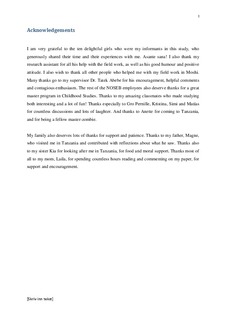| dc.description.abstract | This master thesis explores the lives of young Tanzanian girls. The field work that the thesis is based on was conducted in the town of Moshi in Northern Tanzania in August and September 2011. The main informants in the study were 10 girls between 13 and 18 years. The girls lived in the outskirts of the town, in a neighbourhood which is part suburb, part rural village. The girls belonged to the less affluent part of the population, and none of them attended school. Tanzania has been the country in the world with the lowest attendance to secondary school. In recent years, enrolment to secondary schooling has increased, though 75 % of young people in Tanzania do not attend post-basic education, mainly due to economic reasons. Many of these young people, and girls in particular, have a hard time finding employment. With large amounts of unstructured time on their hands, young people like my informants spend much of their days ‘hanging around’ in the streets.
This study is based on central ideas within the new social studies of childhood, and views children as competent agents in their own right who are active in the construction of their subjective life worlds. As the informants in this study could also be categorised as adolescents, theory from youth studies has also informed the thesis. Focusing in part on the girls’ relations to places, the study also uses literature from the field of children’s geographies. Children and young people are both shaping and shaped by the culture they live within. By drawing on different approaches to the understanding of young people, the thesis sheds light on both the informants’ subjective experiences and the structures that shape their experiences.
Through various qualitative research methods the thesis searches to find out how teenage girls who do not attend secondary school perceive their everyday lives. The study also looks into the tension between "traditional" culture and "modern" ideas, and how new identities are created. It also seeks to explore teenagers’ aspirations for the future, and how they envision their transition to adulthood in the face of a ‘difficult life’. Some authors have argued that youth transition in the African context is more problematic for young men than young girls, as men are the traditional "breadwinners". This study argues that girls’ desire to make a living for themselves should also be taken into consideration, and their youth transition is therefore no less difficult. | nb_NO |
